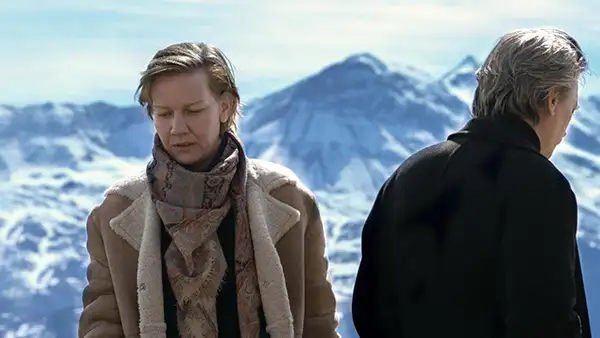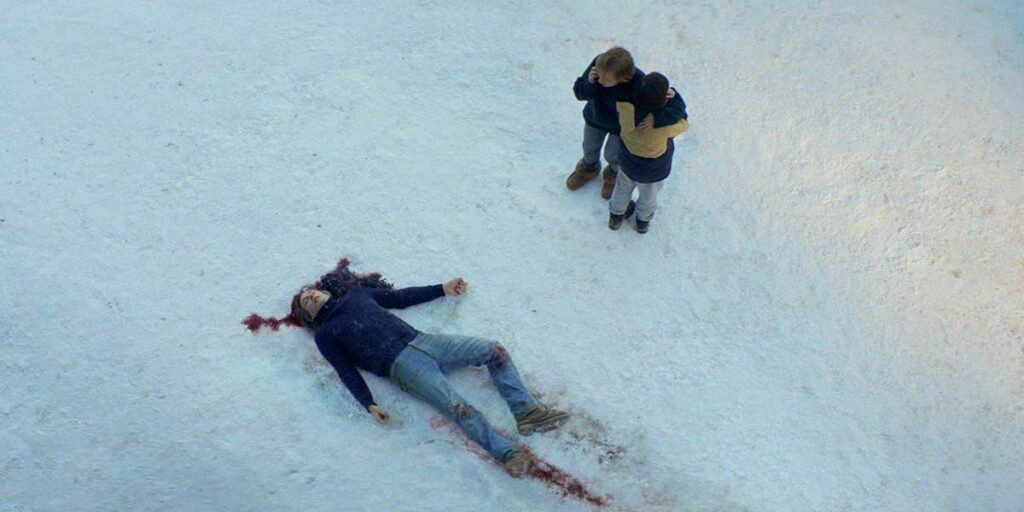Justine Triet’s Anatomy of a Fall is a masterclass in raw emotion and subjective storytelling, with Sandra Hüller giving the year’s very best performance.
Justine Triet’s Palme d’Or winning feature Anatomy of a Fall could’ve been an easy and conventional courtroom drama. It could’ve followed all of the tropes familiar with the genre and played it safe for the audience. Its opening scene lays out the possibility of this film treading familiar ground, as well made as it will be. But something starts to shift within a specific time jump, and that’s where Triet’s film starts to soar and becomes the most gripping drama of the year, with a masterful performance at its core.
The film begins at Sandra’s (Sandra Hüller) and Samuel’s (Samuel Theis) chalet, as Sandra is being interviewed by a student for her college thesis. The interview isn’t going well, because Samuel is blasting a voiceless version of 50 Cent’s “P.I.M.P.” (the second movie released this year to feature this song at a pivotal storytelling point, the first one being Expend4bles, though that’s not a double feature I would ever recommend) on a loop, with each one getting louder. The student leaves, Sandra’s son, Daniel (Milo Machado-Graner) goes on a walk with his dog Snoop (heh) and, as he returns, finds his father lying on the snow with his head bleeding. He is dead.
Sandra immediately says she had nothing to do with his death, and that he must have fallen from his attic. However, her attorney, Vincent (Swann Arlaud), is not entirely convinced, since the autopsy report was inconclusive and cannot rule out murder. Sandra is then indicted for her husband’s death, and the movie cuts to one year later, near the end of her trial. The real movie begins here, but what comes before is equally riveting. It’s highly expository, and could’ve been treated in the most glacial way possible, but Triet never succumbs to a conventional “recollection of the facts” as is common in many murder mysteries. She posits these drawn-out sequences as vital to not only the plot itself but of the audience’s subjective viewpoint of Sandra.
When Sandra initially appears shocked to find Samuel dead, we don’t believe her much. Her facial expressions of aggression from the music in the first scene gives us everything we need to know about her, and she almost immediately looks guilty to us. But then Vincent starts to interrogate her about what happened, and Daniel is deposed. The two talk about Samuel’s death and are so convincing that the audience could have a tendency to join Sandra’s side. But when certain elements of Daniel’s testimony start to crack, who are we supposed to believe?

Anatomy of a Fall never takes a side, which, to some people, could be to its detriment, but is the singular directorial choice that makes this film stand apart from many courtroom dramas and/or murder mysteries. Triet presents Sandra through her personal life the way anyone else sees her, and her media/courtroom presence in the same light. It also helps that the movie is captured like a documentary, examining the characters as they are, not as they want to be seen. Triet (and cinematographer Simon Beaufils)’s aesthetic choices are incredibly minimalist in its first act, observing the characters without judgement and exercising some restraint in how they perceive them.
But when the audience gets to experience [part of] the trial, the camera also shifts, but briefly. Triet punctuates strong dramatic moments with smash zooms and whip-pans, solidifying its vérité aesthetic. But it never feels so excessive that it distracts from the story: it is always in service of the characters. That’s why they are sporadically used at key moments: they enhance the movie further to plunge the audience inside it, as opposed to distancing them away from what is occurring on screen. Rarely has a filmmaker ever been in complete control of their aesthetic, but Triet does it here with incredible verve and a magisterial sense of timing.
Hüller is unsurprisingly phenomenal here. I was already on board the Sandra Hüller for Oscars train in 2016 after seeing Maren Ade’s Toni Erdmann, but now I strongly believe it’s happening. It’s the best performance of her career, no question in my mind about it. We never fully know if she is indeed guilty or not. We may begin to find her guilty, but doubt begins to linger as the investigation continues and the trial reaches its conclusion. By the end of the movie, the ambiguity is still there, and Hüller never leans on one side, through her facial expressions and emotional restraint.
She initially appears reserved, and still exercises some caution in speaking to Vincent and Daniel, but also begins to crack as the trial continues and is incessantly badgered by the prosecution, dismantling the defense’s arguments one by one. We slowly get to see the side of her she does not want the world (and her son) to see, but it slowly gets revealed until a key flashback scene showcases the real Sandra. That flashback is the key to the movie’s subjective viewpoint, presenting it without any distortions, and letting the audience be the judge of what they believe truly happened. But even then, doubt lingers on.
There is, however, no doubt about one thing: Hüller is exceptional in every single scene she is in, alongside newcomer Milo Machado-Graner as Daniel, who has his time to shine near the ending. Supporting performances further balance out Hüller’s turn and give an even more subjective viewpoint than we would initially have with a few characters, and the ending never explains a thing to the audience. It’s up to them to figure out what happened, and if the verdict was correct, based on Triet’s presentation of the events and the evidence laid out in front of them.
Because of this, Anatomy of a Fall triumphs. It never takes the easy way out, and consistently engages its audience through deliberate and meticulously-timed artistic choices, a strong subjective mindset in presenting its story, and the single-best performance ever put on a movie this year in Sandra Hüller.
Triet already made her mark in French cinema with her debut feature Age of Panic and her collaborations with Virginie Efira in In Bed with Victoria and Sibyl. In Anatomy of a Fall, she becomes one of the most important authorial voices in cinema (and not just in France), and I cannot wait to see what she will bring to us next.
Anatomy of a Fall is now showing in US theaters. The film will be released in cinemas in the UK & Ireland on November 10.

